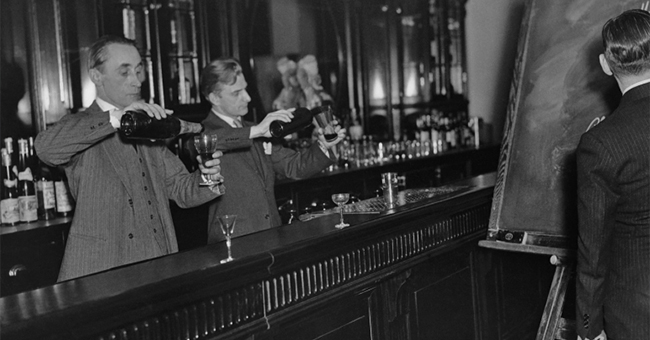Most people associate staging with the culinary world — young chefs take a leave of absence from their current position to work under a master chef and learn new techniques. Many times, the restaurant at which these chefs are staging assist the chefs with living expenses, as most kitchen stages can last as long as three months. However, bartenders looking to stage are often on their own financially. And unlike picking up a guest shift for a night or two, staging as a bartender requires research, goal setting, a brief, unpaid leave of absence, and a crash course in financial planning.
We sat down with bartending veterans Franky Marshall and Leslie Ross to talk about their stage experiences and what advice they would give bartenders considering staging.
Franky Marshall, spirits educator and world-traveling bartender, decided in 2011 it was time to challenge herself. She took an interest in “molecular mixology,” and sought to learn more about it at London’s 69 Colebrooke Row, where bartenders were using culinary techniques to create flavors and distillates.
“I knew of Colebrooke Row’s reputation and read about Tony Conigliaro. I was reading their blog and noticed they were offering stages. It sounded like a great opportunity.”
Colebrooke Row solicits interns for one to two week experiences, but the expense of traveling to and living in London was still all on Marshall’s shoulders. Concerned about finding affordable lodging, she contacted LAB co-founder, Colin Asare-Appiah, who helped connect her with barman and global brand ambassador for Bombay Sapphire, Merlin Griffiths. Griffiths provided a roof, allowing Marshall to stay for 10 days above his London pub.
With her finances in order, she began to research Colebrooke Row and their techniques prior to her arrival, but nothing prepared her for what she was about to experience.
“There was a ton of new information coming at me all at once. It was really fascinating to see how they worked, how ideas came together, the vast array of equipment and ingredients they had at their disposal… things I’d never heard of or seen before. I remember being asked to put the ‘blahdeblah’ in the ‘whatchacallit,’ and thinking ‘what the hell is a blahdeblah or whatchacallit?’ Minor panic attack.”
Then there were measurement conversions to learn, with jiggers in milliliters instead of ounces. But through it all, Marshall found Colebrooke Row’s staff to be patient, professional and highly functioning, despite the harried pace of service while mentoring a staging bartender from America.
“My experience was fantastic — exciting, rewarding, but challenging at times. Not only did I get to see the way the bartenders at Colebrooke Row worked, but in my free time I went to other bars to see first hand what else was going on in London. It was a completely different world than the New York scene I knew — much more showmanship, precision, and technique. They were doing unique cocktails presented in beautiful glassware with inventive, cheeky serves and fanciful garnishes. The whole experience immediately changed the way I thought about bartending, and started to shift the way I bartend. I wish I had stayed another week.”
Franky’s advice for staging
“Give serious thought to what you’d like to learn and what your goals are. Do some research on bars and/or specific bartenders. See if you have a mutual contact at the bar who can make an introduction (I had two letters of reference written by mutual industry friends of mine and Tony C’s). Hopefully you’ve already started saving money, because once you do make contact, there could be an opening right away and it may not be there in six months. Read up on their techniques and research the bar and people you’ll be working with. Ask a ton of questions, and always be serious, gracious, and thankful.”
When Leslie Ross, bar director of Treadsack restaurant group, decided to come back behind the bar after working with a boutique distributor, she had no idea how quickly her career goals and philosophies would change. Ross began working at Triniti’s Sanctuari Bar in Houston after a year-long hiatus from crafting cocktails and was loving every minute of it. But there was still something missing for her behind the bar.
“I had taken a year off from competing, so when I started back up again, I found myself advancing in competitions and succeeding at what I thought were unreasonable goals. I decided to step it up. I’ve always wanted to see what it was like to work in an environment like The Aviary, and doing a stage there seemed like a good chance to learn.”
Ross sent an email to The Aviary not expecting to hear back, but within two days, the bar asked how soon she could get to Chicago. Triniti paid for her plane fare, and she was able to stay at friend’s apartment for free during her stage.
After taking in the Chicago bar scene for a couple of days, Ross walked into The Aviary on a Wednesday before service.
“That’s the day I totally got my ass handed to me.”
Nothing could have prepared her for the frenzied pace of service, working the expo, learning drinks on the fly, and near daily panic attacks that threatened to overwhelm her. She credits bar director, Micah Melton, for keeping her calm.
“This stage was a milestone in my career. I was only there for five nights, but it focused me in a way I could have never imagined. The Aviary was a crash course. But I realized, while people were giving up personal time and freedoms, they loved their work. They were doing it for something bigger than themselves. I wanted that too. Micah told me to trust my skills, put my head down, and do what I love. It recalibrated my mindset as a bartender. It was a reset of goals. I could not have asked for a better stage despite sobbing after service every night.”
Ross believes doing a stage is the best reality check for a bartender. Not only does it force you to test your skills behind a foreign bar, but it also allows you to continue perfecting your craft.
“This stage taught me I can panic and still get through the weeds to the other side. Put your head down and do what you’re trained to do. Don’t be afraid to ask questions and learn.”
Ross spent five long days with the bartenders at The Aviary — working many nights on little sleep, having eaten even less. It was a pivotal moment in her career, forcing her to reevaluate her goals. After finishing her stage, she made the decision to leave Triniti. Last November, Ross took on the daunting task of opening five bar programs in 2015 with Houston restaurant group, Treadsack. She attributes her endurance and success to five panic-filled days staging in Chicago.
Ross has another stage set for February 2016, when she will travel to London to study sustainable bartending under Iain Griffiths and Ryan Chetiyawardana of White Lyan.
Leslie’s advice for staging
“Figure out what you’re trying to learn or who you want to learn under. You may have one goal and come out of your stage with so much more than you expected. I absolutely think all bartenders should stage. Reach out to the bar you want to stage in, get to the highest person you can email. Make it known you want to stage. Make sure you are financially prepared for the stage too. That may be the first lesson you learn. You need to save. Learn everything you can while trusting your training.”
Although staging in an exotic new city adds to the appeal, there are obvious benefits to staging in your own town instead. USBG Atlanta Chapter President Ian Cox gives his advice on how to get a stage experience without leaving home.
What’s the difference between staging, guest spots, and apprenticeships?
With the rise in craft bartending, we’re seeing a movement toward running bars like successful kitchens. Staging is becoming popular for this reason. For the bars, it’s essentially free labor. Another option is paid apprenticeships. Your job is to work and learn under a specific bartender. Guest spots are for people to showcase their skills at another person’s bar. It’s not necessarily a learning situation.
How do you set up a local stage?
It’s the same approach as an out of town stage except you save on lodging, meals, and travel. See what people in your hometown are doing at their bars. If you find a bartender or bar you want to learn under, approach that person, ask for a stage, and then figure out a time that works for everyone’s schedules.
How can your local USBG chapter help?
If you aren’t sure where to start looking, part of what we do at the USBG is connect people in the industry locally as well as nationally. Contact your chapter, tell them what you want to do, and ask questions. They can help guide you to bars and bartenders willing to consider a stage.




